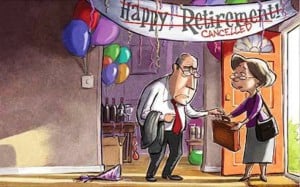 Debt settlement companies have been preying on consumers for far too long. We’ve warned you about them in two previous blogs – Beware of Debt Settlement Companies and The Latest on Debt Settlement Companies. In 2010, after a decade of massive growth in the U.S. debt settlement industry, the FTC brought in new regulations that effectively banned debt settlement companies and forced many of them to migrate north of the border. Currently there are 18 companies and 34 credit counselling providers offering debt settlement services in Ontario. With ever mounting numbers of complaints about unsuspecting consumers being taken advantage of by unscrupulous debt settlement companies, the Ontario government has finally taken action and passed Bill 55.
Debt settlement companies have been preying on consumers for far too long. We’ve warned you about them in two previous blogs – Beware of Debt Settlement Companies and The Latest on Debt Settlement Companies. In 2010, after a decade of massive growth in the U.S. debt settlement industry, the FTC brought in new regulations that effectively banned debt settlement companies and forced many of them to migrate north of the border. Currently there are 18 companies and 34 credit counselling providers offering debt settlement services in Ontario. With ever mounting numbers of complaints about unsuspecting consumers being taken advantage of by unscrupulous debt settlement companies, the Ontario government has finally taken action and passed Bill 55.
What will Bill 55 do? It creates new standards of conduct for debt settlement companies:
- Banning them from charging upfront fees
- Limiting the amount of fees consumers are charged and prohibiting the payment of fees before services are provided
- Requiring clear, transparent, and detailed contracts that include information about the effect of the contract on the consumer’s credit rating
- Requiring credit counsellors to disclose information to the consumer about how their organization is funded
- Establishing a 10-day cooling-off period, providing consumers more time to consider their agreements with companies
- Allowing the licences of non-compliant companies to be revoked
Bill 55 is certainly a great step toward protecting consumers from debt settlement companies. Hopefully it will be restrictive enough that they will disappear from the landscape as they did in the U.S.
Please stay away from debt settlement companies! If you are having serious debt problems, contact Ira Smith Trustee & Receiver Inc. We are professionals, federally regulated, licensed and subject to a strict code of ethics. Our fees are regulated by the Federal Government and are usually much less than the debt settlement companies who make unsubstantiated claims. We can help. Starting Over, Starting Now you can live a debt free life.









